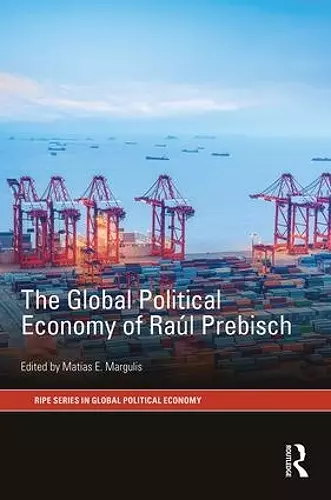The Global Political Economy of Raúl Prebisch
Format:Hardback
Publisher:Taylor & Francis Ltd
Published:7th Mar '17
Currently unavailable, and unfortunately no date known when it will be back
This hardback is available in another edition too:
- Paperback£39.99(9780367884796)

The Global Political Economy of Raúl Prebisch offers an original analysis of global political economy by examining it through the ideas, agency and influence of one of its most important thinkers, leaders and personalities. Prebisch’s ground-breaking ideas as an economist – the terms-of-trade thesis and the economic case for state-led industrialization – changed the world and guided economic policy across the global South. As the head of two UN bodies – the Economic Commission for Latin America and the Caribbean (ECLAC) and later the United Nations Conference on Trade and Development (UNCTAD) – he was at the frontline of key North–South political struggles for a fairer global distribution of wealth and the regulation of transnational corporations.
Prebisch increasingly came to view political power, not just economic capabilities, as pivotal to shaping the institutions and rules of the world economy. This book contextualizes his ideas, exploring how they were used and their relevance to contemporary issues. The neoliberal turn in economics in North America, Western Europe and across the global South led to an active discrediting of Prebisch’s theories and this volume offers an important corrective, reintroducing current and future generations of scholars and students to this important body of work and allowing a richer understanding of past and ongoing political struggles.
This is a terrific volume which contributes to a much-needed movement away from the dominant intellectual histories of global political economy and their ‘peripheralising’ of non-English-speaking and non-Western thinking and thinkers. But it also develops an important and thought-provoking reflection on what taking this step means for the field itself, in expanding its theoretical and analytical horizons, and defining – or redefining – its subject matter. A top-notch collection that is essential reading for us all. - Nicola Phillips, University of Sheffield, UK
More than a half-century after the first United Nations Conference on Trade and Development (UNCTAD), organized by Raúl Prebisch, his work on development and the challenges faced by centre and peripheral economies is more relevant and alive than ever. Matias Margulis’s edited volume underlines how, as we struggle again with the failure of mainstream macroeconomic theory to explain and deal with the pervasive negative social and economic impacts of global crises, Prebisch’s insights help us to examine in a critical light the false premises of mainstream economists and propose more effective ways to cope with the current challenges. - Rubens Ricupero, Fifth Secretary General of UNCTAD (1995–2004) and former Minister of Finance, Brazil
This volume is a powerful reminder that many crucial ideas and approaches in building the contemporary world order came from the Global South, but are shamefully ignored in the mainstream accounts. By offering a sophisticated and wide-ranging analysis of Raul Prebisch’s ideas and practical contributions, the contributors to this volume significantly advance the study of Global Political Economy and Global International Relations. - Amitav Acharya, American University, US
Matias Margulis has put together thought provoking perspectives on the momentous contributions of Raúl Prebisch, a critical, innovative theorist of the global political economy and an actor in global economic governance. He has been erased, or as this book claims peripheralised, as a by-product of neoliberalism. This book is not only a timely rescue but also as a fascinating contribution to understand the roots of our current era of turbulent global change. - Diana Tussie, Facultad Latinoamericana de Ciencias Sociales, Argentina
ISBN: 9781138219779
Dimensions: unknown
Weight: 476g
218 pages